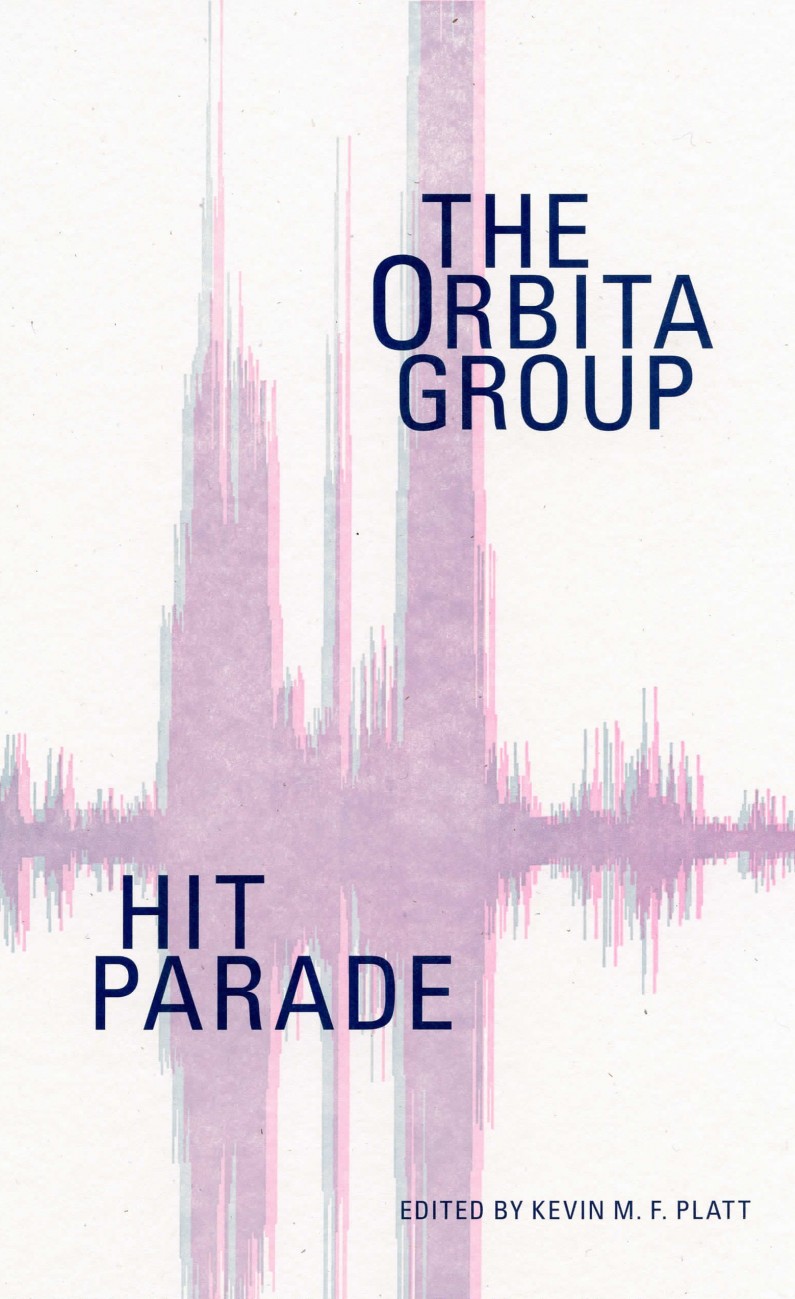Interview: Kevin M.F. Platt on Translating the Orbita Group

Exchanges Skyped with Kevin M.F. Platt, editor and translator of Hit Parade: The Orbita Group. We asked him about the innovative translation process that led to this beautiful publication with Ugly Duckling Presse.
How were you first drawn to the Orbita group?
I’ve worked on contemporary Russian poetry, but also on Russian poetry more broadly, and I have a lot of poet-friends in Russia. Then in the beginning of the century—sounds funny—I started having kids. and my wife is from Riga. We moved to Philly and one summer we wanted to get out of the crazy sticky awful heat, and so my wife suggested we go to Jūrmala, a beach resort outside of Riga, along the Baltic seashore. So we started going there, because it’s close to Russia, it’s easy to go to, you don’t need a visa, and it’s a sleepy beach resort. And the weather is perfect, with white sand beaches, and the sun never seems to go down. It was around this time that some of my Russian friends introduced me to the Russophone poets of Riga, and I just sort of got to know them. At some point, too, I decided that I wanted to write a book. It started out as essays but then it turned into a book about Russian culture in the Baltic area. And Riga is a peculiar place in that there are a lot of Russian speakers there, but it’s a European city, a NATO member state, an EU member state… and these are extra-territorial Russians—about a half million Russians in Latvia, they make up 26% of the population. Maybe more.
Latvian is the first language there?
That’s an interesting question. Latvian is the language of state. And the status of Russians in Latvia is a complicated and fraught question, because it was under Soviet occupation for 40 years. There were always a lot of Russians around in Riga, because before the 20th century Latvia was a part of the Russian empire and then it gained independence in 1919 and was an independent state until 1940, when it was basically annexed—invaded, you could say—by the Soviet Union. Then it was occupied by Nazi Germany, then it was occupied again by the Soviet Union until 1991. And lots of Russians and Russophones moved to Latvia during the soviet era so that almost half of the population at the time of independence, in 1991, was Russian or Russophone, and not all of them got citizenship following independence. A large number of them were military personnel, and were stationed in the Baltics. If you were not born in Latvia or could not trace your ancestry to Latvian citizens, you did not get automatic citizenship in independent Latvia, so many of those Russians left. But a considerable number of them stayed, which is why you get this 26%. And Riga itself is about half-and-half Russian speaking and Latvian speaking. So all of this is background, which allows you to see that the status of Russians in Latvia is rather fraught.
There are a lot of Russians there that feel discriminated against. Many identify with the politics of the Russian Federation. You can imagine in the last couple of years since the Ukraine crisis that it’s been a more and more problematic thing. But the Orbita poets, I think, are most fascinating in that they are very intently focused on creating a multi-lingual practice that bridges between Russian and Latvian. They’re very committed to a cosmopolitan conception of Riga and Latvia; not as a Russian space, but as a space where Russian is one of many languages. They’re dedicated to Latvia itself and they all speak Latvian fluently, as well as Russian. All their publications in Latvia are bilingual publications, Russian and Latvian. It’s a very interesting configuration.
How as a translator did you grapple with the transience that the poems represent as Russian literature perpetually crossing nation and language borders, as they do? In the intro you say this is “Russian poetry out of bounds.” And it seems that there is so much work being done in the intro for the collection of poetry. I’m wondering how, in the poetry itself, did you feel like you were navigating that multilingualism in bringing them to monolingual English, and the Anglo reader.
It’s a nice thing that the edition is bilingual. and I’m really grateful to UDP for doing that, and they do a lot of great dual language editions. My colleague here at UPenn, Charles Bernstein, has written quite eloquently about the US as a multilingual society. And I wouldn’t claim that this collection is aimed at any one particular subsection of the US cosmopolitan society—
To be more specific with my question, I was thinking more about how the English and Russian are figured together in this edition, which forcibly omits—or by nature of a book’s construct—impedes a representation of the possible triumvirate of Russian, Latvian, and English. Translating for Anglo readers seems to have necessitated a loss of that representation.
Yeah, it would be beautiful to do a trilingual edition and have the Latvian there as well. That probably would have made it too expensive. And it’d be hard to figure out how to do that graphically. Speaking of graphically. The Orbita poets also have a press. They publish many of their own books. They’ve also been published in monolingual editions in Russian, in Russia. But all of these multilingual things they do, they publish themselves. They also publish a lot of people who aren’t in the Orbita group, so they have a quite active little press, and do incredible variations on what a bilingual book can look like. I’ve got a few of them right here. They’re continually challenging themselves to come up with new and interesting ways to make multilingual books work.
[Goes to bookshelf.]
See my problem with books is I have a lot of them but they’re always in terrible order… I can never find anything… I tell myself that it leads me to have all kinds of serendipitous discoveries, you know? I look for one thing and I find something else…
That’s how I am with my notebooks…
Yeah…
Well, I was looking for Khanin’s most recent book, which is in both Russian and Latvian, and it’s held together by magnets, so you can take them apart or put them together…they also published a book which was translations of Latvian poets into Russian. And they distributed a flyer with it which showed you how it was meant to be read… you could open it up on the middle of the table, so that the person sitting on one side would be reading the Latvian, and the person on the other side would be reading the Russian—the texts were inverted and facing each other on the pages of the open book. So they’re quite inventive and fun in the way they do these experimental typographic objects in multilingual publishing. Anyway: you said transient. I don’t think I would call them transient in Riga, I think this is very much Riga poetry. These are guys that are all born in Riga and have grown up there, and are very attached to Riga as a city.
‘Cosmopolitan’ is a good word for them. And obviously ‘Orbita’ is this image of motion. But I think transience suggests that they’re here for a while and then they’re going to move on, whereas I would think that they have a fixed center of motion around Riga, with orbits zipping out in a lot of different directions—towards Europe, towards Russia, and now towards the US … But these are Riga people, and I think that Riga is where they really want to be…and where they belong. They’re the soul of multilingual practice of Latvian and Russian. When you talk to Russians they’re all very conscious and proud of the fact that Russian is a major transnational language; it’s spoken by people all over the place. Latvia has its diaspora but Latvian is a tiny language that's mostly spoken in Latvia, and there’s something very sweet about the contrast of this huge expanse, and this very intense localization; large and small, beaded together. And I think that’s kind of what an analog would be for what these poets practice, and their location in the world—global yet very local at the same time.
That leads to my question about the poetics of place, which figure prominently throughout the poems, some more than others in my reading. I wondered if, for you, bringing them into English impeded on the contextual specificity. Does it have a distancing effect? We English readers can’t always access what is expressed/dialogued-upon in their cosmopolitanism…
In translation there’s always a failure or success, depending on how you define it. There’s an impossible ideal in one conception of translation, which is you’re somehow going to find the perfect equivalent to transmit everything about a poem—its content, its specificity—into another place, for another reader in another language. That’s clearly impossible, and at the same time it’s quite possible to know nothing about a poem. You could just not translate it. Translation is always somewhere on this continuum of communication between allowing someone to participate in this very extreme and linguistic event, which is a lyric poem, in some way from a distance, from another language, versus not being able to do that. So in that sense, I wouldn’t say that this act of translation is any different from any other act of translation. These very particular kinds of cosmopolitan things that are going on in these poems, how translatable are they? Some of them are almost completely untranslatable. I mean, all of these very specific local scenes, local pieces of the Riga-built environment that you don't know anything about until you go to Riga... Or, certain of the poems which are very specific meditations on inter-ethnic relations in Riga or on the experience of Eastern Europeans. Artur Punte actually spent some time in Ireland, and I think a couple of his poems relate to his experience then and his insights into guest workers there, which is an experience which unites both Russians and Latvians, many of whom wound up for a while in Ireland and in the UK, which was one of the destinations for migrant labor from Latvia during the early 2000’s.
So to what degree are those things translatable? To some degree. I feel like we’ve done a fairly good job, and that part of this success relates to the translator collective of this work—and it should be said that one of the primary audiences for the publication IS this multilingual scene around UDP, or around Kelly Writer’s House at Penn, but maybe also around Iowa, which is continuously a site for writers from around the world translating each other and engaging in intense interaction. I think about avant-garde or experimental poetry less as something which is located in specific languages or nation-states, and more as an archipelago that connects different writing communities across the world, which are continuously translating each other. In the US there’s this overhang of a very large monolingual population. I think that’s somewhat atypical of the way most experimental poetry is written in the rest of the world; especially in Europe, where people are continuously going to poetry festivals, and translating each other, etcetera.
It’s funny that English turns out to be a vehicle for a very insular poetic practice, which is the poetic practice of a poetic mainstream in the US, and it is simultaneously the lingua franca which is used by a great many poets in places across Europe. I mean, there’s a lot of direct translation from language to language, but many poets get translated into English in order for many other poets in Europe to be able to read them, not in their first language but in their second. This book would be no different in that sense. It’s a book which allows people in the US to read Orbita’s poems. It’s also a book that these poets will carry with them to poetry festivals in Europe which will allow—for instance, German poets that don’t have Russian but might have English—to have an acquaintance with some of their stuff. Although, they’ve been translated into German, as well, so let’s instead think about Italian, in which there’s no edition of Orbita available yet. So, I think experimental poetry really does exist in this global archipelago. It’s nice too, that we now have not only a lot of mobility in a world that has borders clearly, and some people can’t move as easily as others. But there’s a lot of poets moving around, a lot of different festivals. And Europe, where these poets are, is one of these places where poets move around a lot. Hopefully the Schengen will not go away entirely as a result of this migratory crisis. But it’s easy to get from Riga to, say, London or Denmark at this point. And then there’s also the Internet, which is what is making this conversation possible. Which we should talk about as well, because a lot of these translations were enabled in part due to ties in virtual communications.
This is all a long answer to your question: there’s always an untranslatable core, but I don’t think there’s a natural place of poetry in one language, or in one specific location, especially with poetry like this. I think it’s MADE for translation. And the translation is part of the communicative environment that the poem is designed for. Even in the smallest local circle, like if you go to a poetry reading, and you read your poem in one language to an audience that reads only in one language… some people are going to get one thing, and some people are going to get another. A poem is always surrounded by a series of baffles and filters that branch out in various different directions to different people, and tie them together in lots of different ways, sometimes through one language and sometimes through two, and sometimes via three. That’s how I imagine this poetry, and that once again gets back to these poets’ practice, right? On the one hand there’s something local about it, on the other, it’s intended for participation in these larger conversations.
Let’s look at the poem “The world as I know it’’ by Timofejev, which is one of the few really difficult translation situations, because of the word “miera”. If you look at the poem…(we turn to the page)
It’s from the Slavic/Baltic root, and has the same root as ‘мир’, which means ‘world’. So it’s this kind of weird ontological construction, the same word at the beginning and the end of the sentence. Except ‘мир’ doesn’t mean the same thing as ‘miera’. ‘Miera’ means peace, ‘мир’ means ‘world’, but in Russian it also means ‘peace’. So there’s this untranslatable pun happening. ‘The world as I know it begins on peace street’, or maybe ‘peace as I know it begins on peace street’…
Plus the local specificity…
You can’t really translate it into Russian, because of this pun. And you can’t translate it into English, obviously. I could’ve translated ‘мир’ into peace, but that doesn’t quite work, and the pun disappears. And the poem, if you read it, is really about conflict avoided through clever, ironic twists. Which I think is a statement about Timofejev, and about this small cosmopolitan scene. Anyway, if you read the introductory essay, I go into more detail about it, and I think I also answer a bit more thoroughly the question you ask about what is local/global, and what is translatable.
This makes me wonder if English is the anathema to cosmopolitanism. We recently had a talk with Idra Novey, and a question came up about how writers in the world are writing in English, rather than their first language. And talking about this one instance, this one word which plays with and carries so much contextual significance, and then disappears in its English rendering… it makes me wonder about cosmopolitanism as an antidote to this kind of Anglo-washing, a way to de-centralize English, as-such…
What’s true about any translation project, is that it’s always on this continuum between two kinds of failure.
Yes, which makes me think of Nabokov’s Eugene Onegin, maybe sitting on one extreme side of that continuum.
Yeah. A terrible translation.
Or is it?
No. It’s a terrible translation, because he’s a maximalist. He has this idea that translation is somehow a total information transfer problem, that somehow you have to translate Everything that’s in the original. But that’s not possible even talking to someone. Communication doesn’t actually work like that. It’s not message encoded then decoded … language is an event which takes place between people, that people contribute to, and participate in. And it’s multi-dimensional, it happens across distances. And it’s more like a ritual that you partake in, rather than a transfer of information.
This segues into my question about the process, and the other translators…
Yeah, let me tell you a little about that. It all sort of happened by chance, the first time that I did this. And now it’s becoming “a thing.” The first time it happened was in 2011. Thanks to the New York cultural exchange organization CEC Artslink, we were able to bring a number of Russian poets to Penn. We organized a translation symposium with these poets that all sort of came together flying by the seat-of-our-pants. We created Google Docs with the poems of each of the poets from Russia, but also included works by poets affiliated with Penn and Kelly Writers House who we invited to the symposium. And then I also invited a whole bunch of my friends, mostly from the East Coast, who are more or less bi-lingual to varying degrees, so some scholars of Russian poetry, some bi-lingual Russian- and English-speaking poets. So they were all invited, then we virtually worked together on draft translations of the Russian poets, before anyone even arrived at Penn.
So when the symposium began, we had all these drafts on hand. And people were invited to ‘mess with’ other people’s drafts; so someone would translate something, and then someone else would produce a different version of it based on theirs—so this collaborative activity already took place virtually before we came together in Chicago. When we got people here we spent three or four days sitting together, close-workshopping poem-by-poem in small groups—the poet and multiple translators, working together. Kelly Writers House is a really great place to do this kind of work. It produced a really wonderful and stress-reducing collaborative process. I think translation sometimes can be very fraught. But in larger groups like this, in which no one “owns” the translation, it becomes relaxed. There are of course professional translators, who sometimes can get really possessive of a certain writer. But we didn’t have any of that—no one “owned” anyone in this gathering. So that’s where a lot of the initial translations came up for this book.
Following the 2011 symposium I did a lot more work myself, to fill things out, and I guess if there is “a translator” for the collection it’s me, and I’ve sort of been turned in to the go-to translator for Orbita in English. But I should also say that I’m not really a professional translator, I don’t feel particularly possessive about translation… I have other things that I’m possessive about.
It’s interesting that you bring up the word “possessive”. I’ve thought about that, too. There’s something thematic about being in the position of the English translator, sort of this coveting that can happen with source-text authors and their works—especially with works from a ‘minor’ language.
Yeah, there is a kind of neurotics of translation. People do get a little overly-involved in being the ‘representative of’ a poet, hoping that their poet is going to get the Nobel Prize, and then they’ll be the Translator of The Nobel-Prize-Winning Poet or something… I do see that. But, anyway, we didn’t have that problem with this collaboration.
Were there any specific moments, lines, in which the collaborators had trouble coming to a consensus on a decision?
There was no strife, but there were was an instance with a poem I translated, by Khanin, that was a total failure. Then I asked Matvei [Yankelevich] to do it, and he produced a much better translation. It’s on page 149: “You can say what you want”. I produced a translation which was far too exact. It’s a prosaic poem, that employs a lot of stalling tactics—sort of an extended etude in beating around the bush. My translation was much too precise. It had a lot of long lines, Latinate, too wordy. But Matvei, I think, came out with a very beautiful version of it. And that was something that I just couldn’t do. And there were a few poems that dropped out of the collection, because we all agreed that they just didn’t work for one reason or another… too wordy, not accessible enough in English…so, some things just didn’t make it into the final edition. But I remember, for instance, a few of the Timofejev poems feel like they’re free-verse, so then you translate them as free-verse. But then it turns out that people are really attached to certain kinds of rhythms, and so, for example “Postcard from the South”, on page 15 had to be totally re-translated. It turned out that it was really important for Timofejev to have these three strong stresses align. It’s almost iambic in the end. We had to work on that a lot. So there were things like that, but there were no moments of impossibility. I considered dropping “The world as I know it” from the volume, because of its untranslatability. And then I realized that I really had to put it in, and try to explain it a little bit, because it’s such a pretty poem.
It also felt essential, through the introduction... opening up the reader to some of the challenges encountered in rendering these poems into English, as it does.
Yeah, it’s something untranslatable that can be pointed to, talked about. But on the whole I feel really happy with the collection, I feel like it manages to get across a lot of stuff.




